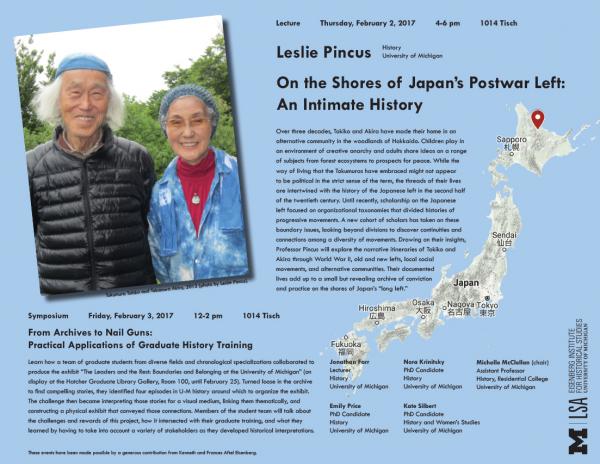EIHS Lecture: "On the Shores of Japan’s Postwar Left: An Intimate History"
Leslie Pincus, University of Michigan
Over three decades, Tokiko and Akira have made their home in an alternative community in the woodlands of Hokkaido. Children play in an environment of creative anarchy and adults share ideas on a range of subjects from forest ecosystems to prospects for peace. While the way of living that the Tokumuras have embraced might not appear to be political in the strict sense of the term, the threads of their lives are intertwined with the history of the Japanese left in the second half of the twentieth century. Until recently, scholarship on the Japanese left focused on organizational taxonomies that divided histories of progressive movements. A new cohort of scholars has taken on these boundary issues, looking beyond divisions to discover continuities and connections among a diversity of movements. Drawing on their insights, Professor Pincus will explore the narrative itineraries of Tokiko and Akira through World War II, old and new lefts, local social movements, and alternative communities. Their documented lives add up to a small but revealing archive of conviction and practice on the shores of Japan’s “long left.”
Leslie Pincus is an associate professor in the Department of History at the University of Michigan. A historian of modern Japan, her research interests span intellectual, cultural, social, and environmental history. Professor Pincus has written on the intersections of philosophy, culture, and politics during the interwar years in Japan. She has also published on early postwar cultural and social democratization. Her current project charts a genealogy of social movements extending from the early twentieth century across the millennium, with a focus on how individual lives become historical and larger histories become intimate. Among her publications are Authenticating Culture in Imperial Japan: Kuki Shuzo and the Rise of National Aesthetics (University of California Press, 1996) and Open to the Public: Studies in Japan's Recent Past, a special issue of positions: east asian cultures critique (April 2002), for which she served as guest editor, author of an introductory essay, and contributor. More recent articles include “Revolution in the Archives of Memory: Founding the National Diet Library in Occupied Japan” in Archives, Documentation, and the Institutions of Social Memory, edited by Francis X. Blouin Jr. and William Rosenberg (University of Michigan Press, 2006), and “On the Shores of Japan’s Postwar Left: An Intimate History” in A New Insurgency: The Port Huron Statement and Its Times; edited by Howard Brick and Gregory Parker (Maize Books, an imprint of Michigan Publishing, 2015).
Free and open to the public.
This event is part of the Thursday Series of the Eisenberg Institute for Historical Studies. It is made possible by a generous contribution from Kenneth and Frances Aftel Eisenberg.
Leslie Pincus is an associate professor in the Department of History at the University of Michigan. A historian of modern Japan, her research interests span intellectual, cultural, social, and environmental history. Professor Pincus has written on the intersections of philosophy, culture, and politics during the interwar years in Japan. She has also published on early postwar cultural and social democratization. Her current project charts a genealogy of social movements extending from the early twentieth century across the millennium, with a focus on how individual lives become historical and larger histories become intimate. Among her publications are Authenticating Culture in Imperial Japan: Kuki Shuzo and the Rise of National Aesthetics (University of California Press, 1996) and Open to the Public: Studies in Japan's Recent Past, a special issue of positions: east asian cultures critique (April 2002), for which she served as guest editor, author of an introductory essay, and contributor. More recent articles include “Revolution in the Archives of Memory: Founding the National Diet Library in Occupied Japan” in Archives, Documentation, and the Institutions of Social Memory, edited by Francis X. Blouin Jr. and William Rosenberg (University of Michigan Press, 2006), and “On the Shores of Japan’s Postwar Left: An Intimate History” in A New Insurgency: The Port Huron Statement and Its Times; edited by Howard Brick and Gregory Parker (Maize Books, an imprint of Michigan Publishing, 2015).
Free and open to the public.
This event is part of the Thursday Series of the Eisenberg Institute for Historical Studies. It is made possible by a generous contribution from Kenneth and Frances Aftel Eisenberg.
| Building: | Tisch Hall |
|---|---|
| Event Type: | Lecture / Discussion |
| Tags: | History, Japanese Studies |
| Source: | Happening @ Michigan from Eisenberg Institute for Historical Studies, Department of History |
The Thursday Series is the core of the institute's scholarly program, hosting distinguished guests who examine methodological, analytical, and theoretical issues in the field of history.
The Friday Series consists mostly of panel-style workshops highlighting U-M graduate students. On occasion, events may include lectures, seminars, or other programs presented by visiting scholars.
The insitute also hosts other historical programming, including lectures, film screenings, author appearances, and similar events aimed at a broader public audience.


